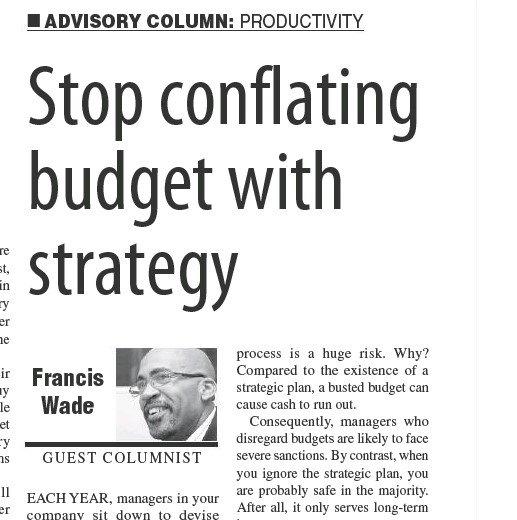Each year, managers in your company sit down to devise budgets for the next twelve months. As a participant in the process, you see that each department’s spending reflects certain priorities. Where do these come from? Are some correct in calling them “strategic”? Should they be reconciled in some way?
Managing costs has become a bigger priority than ever in these pandemic times. The best method of control? It’s nothing new: negotiate budgets with your department managers. Then, hold them to account.
There is no question that this process works. It sets expectations and regulates purchases. In fact, some companies use the terms “budget” and “revenue targets” interchangeably in a nod to its universal acceptance.
However, as negotiations proceed each year, inevitable questions arise. Each department appears to be operating from its own background assumptions. Where did they come from? And what strategy is the unit pursuing? Is it related to the overall corporate plan?
Perhaps you are like many managers who notice these discrepancies. They exist, but you want them to disappear. The answer? Pull together a single “strategic plan” which covers all the budgets at the same time. Towards that end, a mandatory retreat is announced.
While this reasoning may appear sound, it’s often deeply flawed. A budget should not be conflated with a corporate strategy for many reasons. Why? Here are just a few.
Reason #1 – Required Budget vs Optional Strategy
In terms of immediate threats to your business, a broken budget process is a huge risk. Why? Compared to the existence of a strategic plan, a busted budget can cause cash to run out.
Consequently, managers who disregard budgets are likely to face severe sanctions. By contrast, when you ignore the strategic plan, you are probably safe in the majority. After all, it only serves long-term interests.
This is just human nature. We pay more attention to our anxieties than long-term concerns. In this context, strategic planning becomes a nice-to-have business activity which adds little real value. When a retreat is not scheduled, nothing changes from one day to the next.
Reason #2 – Strategy as an Afterthought
Your company may be like many. It only thinks about strategic matters when the fear of competition or disruption arises. The trigger might be a case study of failures, such as Kodak or Blackberry. Or a competitor’s advertisement for a new feature you didn’t even know existed.
In these moments, it becomes obvious: strategy matters. In fact, the right strategy probably earned your company the success and stability it experiences today. Someone had a vision of where the company should go.
However, history often reverses itself. I have led many corporate retreats in which the strategic planning activity was scheduled after the budgets were completed. They were merely last-ditch attempts to reconcile different points of view.
Today, the danger in leaving strategy as an after-thought is that your company might be heading into extinction without knowing it.
If you are a top executive, you may not be detecting slow changes underway in your industry. By focusing on budgets before strategies, you fail to scan the horizon for changes before setting priorities. This mistake renders the entire budgetary exercise impotent – a shuffling of the chairs on the Titanic.
But there’s no need to wait for a scare. Instead, examine your current strategic plan. A timeframe of five years or fewer is probably just an update of prior documents. It’s Business-As-Usual, plus some small changes.
If incremental improvements are all that’s expected, get everyone excited about producing a disruptive strategic plan instead.
Reason #3 – Game-Changing Results Become Impossible
Unfortunately, while your company rides on decisions made long ago, the world has continued to change. Before long, competitors will notice your slow-moving ways, leading them to look for disruptive ideas and technologies.
As they climb the learning curve, they anticipate transformations which build on each other. A dramatically different future comes into focus.
Such was the case of Apple’s iPhone division, and much closer to home, Digicel. By the end, thousands lost their jobs as the incumbents’ leaders failed to set a new direction.
If you’re interested in a new paradigm, consider the advice of Dr. Richard Rumelt from the recent Caribbean Strategy Conference.
He recommended that companies decouple budgetary and strategic activities. How? Ensure that they don’t follow the same annual cycle. Break them apart.
At the conference, we also learned to dream big by asking your team to contemplate 15 and 30 year scenarios. What does your company want to happen in decades to come?
Approaching your strategic planning in these new ways can preserve the integrity of the process. It might even keep your company from destruction.

